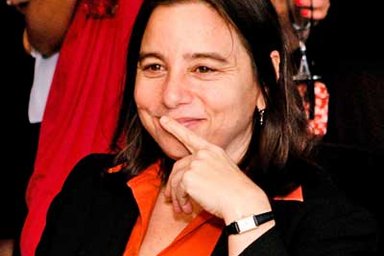Out author and activist Sarah Schulman writes about changing her consciousness about Palestine in her provocative new book, “Israel/Palestine and the Queer International. ” A Jewish lesbian, Schulman understands oppression but wrote the book, as she eloquently says in her introduction, “to confront and expose my own denial in a way that will be helpful to others.”
Over the phone from New York, Schulman spoke passionately about political issues and about how her book urges readers to think for themselves, and become more aware of the Israel/Palestine situation.
“In the particular case of Israel, the main obstacle is that most Americans have no information. If you just read the New York Times and watch American television, you can’t understand what’s happening. Once you start the process of trying to understand what’s happening, the truth is very powerful. You have to face how safe we are, and how uninformed we are.”
She mentioned the bombing of Gaza “is happening while we speak” and that “Israel is the number-one recipient of military aid from the U.S. It’s important for Americans to understand our complicity. There are a number of Americans who want to change Israel receiving military aid from the U.S., which is like $8.5 million a day.”
Schulman said “Israel/Palestine and the Queer International” addresses the fact that Israel is promoting itself as a queer-friendly nation while it denies human rights to Palestinians. As such, Schulman declined an invitation to speak at an LGBT conference in Tel Aviv, and embarked on a solidarity mission in the Middle East. The book chronicles her emerging consciousness and experiences meeting other activists, learning more about the complex political situation and even facing backlash.
But the through line of the book is her personal story. She eloquently and cogently describes how her awareness and transformation happened. She presents interesting stories about the queer Palestinians she meets, and bonds with, including anti-occupation activists, as well as details about the unique coming-out process for Palestinians.
Schulman explained, “I think a lot of Americans, especially Jews, are afraid of going through the process I went through. I wanted to show them what it’s like. It’s OK to not understand things, and see that one has made mistakes. It’s emotionally difficult, but not impossible to do.”
One of the most painful things Schulman has encountered is intensely negative reactions to her book, including horrific hate mail.
“They never say, ‘On page 3, I disagree with this point,’” she vented. “It’s always a very crazy, apocalyptic, annihilating language.”
Schulman’s frustration is palpable. She is trying to educate people about a tense political situation and encourage them to see the points from different perspectives — which they might not be comfortable with at first.
“You have to be a grown-up and do research. The strategy is B/D/S: Boycott/Divestment/Sanctions. Jewish Voice for Peace is running a campaign to divest companies that profit from the occupation. Sabra hummus is a product connected to settlement. It’s not difficult to find out how to be active, and many of the people I mention in the book are very, very available.”
In addition to Jewish Voice for Peace, Schulman mentioned Students for Justice for Palestine and the queer Pink Watching.
“This is a new movement. It’s really starting now,” she enthused, describing a paradigm that has resonance to her activist background. “I was involved in AIDS [activism] from the beginning. When you look at the two communities, you see people profoundly oppressed, and they are depicted in the media as predators. That was familiar to me. We had the international premiere of [ACT UP documentary] ‘United in Anger’ and showed the film to Palestinians. The [ACT UP folks] were inspiring people, they fought until they died, and they had to change their strategy constantly. There was enormous identification.”
While Schulman enourages people to become more aware and politically active, she acknowledged that there are times and places to boycott effectively.
“You have to pick and choose. If we, who are safe, have to miss a few experiences, or are made uncomfortable — it’s fine. We as Americans are used to having everything we want. If we have to be uncomfortable to make a huge social change, that’s OK.
“If there’s going to be a huge campaign, the conditions have to be there for the campaign to be effective. I wouldn’t boycott all queer film fests [that receive money from Israel], but if there’s one where you can take a stand with key filmmakers, it’s worth it to make a campaign. This is the moral issue of our day. It’s like the AIDS crisis. Every person has to make a decision about that they are going to do, or stand by and do nothing.”
Sarah Schulman will hold a conversation with Rabbi Linda Holtzman at 5:30 p.m. Dec. 8 at Giovanni’s Room, 345 S. 12th St.
